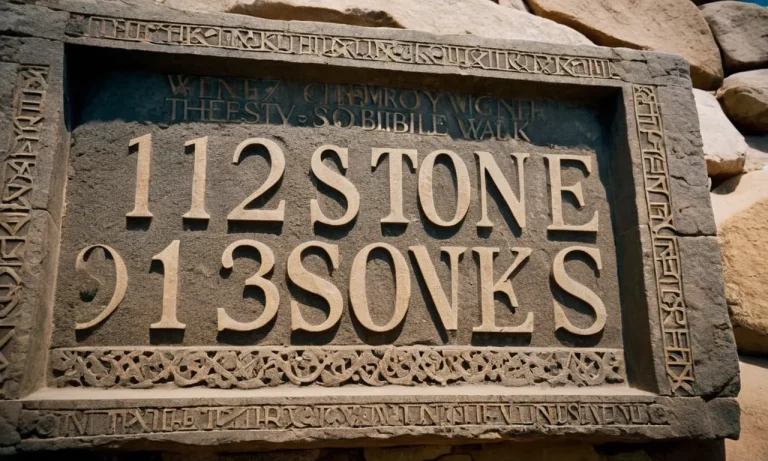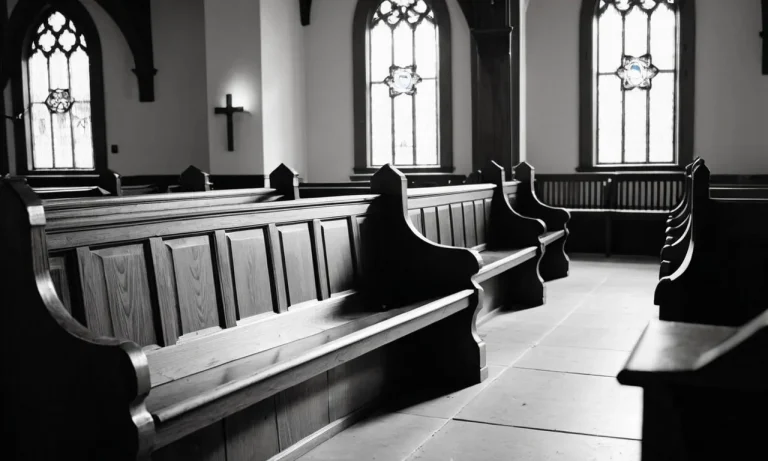What Does The Bible Say About Rebellion?
Rebellion is a complex issue that is discussed throughout the Bible. At its core, rebellion refers to intentionally going against or resisting authority figures that God has established. The Bible makes clear that rebellion against God is a serious sin with damaging spiritual consequences.
However, there are also examples in Scripture of righteous people rebelling against human authorities when they contravene God’s laws.
If you’re short on time, here’s a quick answer to your question: The Bible clearly prohibits rebellion against God and encourages people to submit to governing authorities. However, resistance is permitted when human laws conflict with God’s laws.
In this comprehensive article, we will explore numerous Bible passages about rebellion to understand the biblical perspective on this topic. We will cover God’s view on rebellion against Him as well as rebellion against human authorities.
We will also analyze examples of rebellion in Scripture and explanations of what constitutes righteous resistance versus prohibited rebellion.
Clear Condemnation of Rebellion Against God
The Sin of Rebellion in the Old Testament
The Old Testament makes clear that rebellion against God is a grievous sin. Time and again, the people of Israel turned away from following God’s laws and commands, rebelling against His rightful authority over them (Deuteronomy 9:7).
Their rebellion brought judgment, calamity, and exile (Jeremiah 28:16). Passages like 1 Samuel 15:23 state directly that “rebellion is as the sin of divination.” Just as the sin of witchcraft involves rejecting God’s word, so rebellion rejects God’s sovereignty.
Key biblical figures also stand out for rebelling against God. Adam and Eve flouted God’s command in the Garden of Eden (Genesis 3), and their eldest son Cain rebelled by murdering his brother (Genesis 4).
In the wilderness, Korah led a rebellion against the leadership of Moses and Aaron which brought swift judgment from God (Numbers 16). The overriding lesson is clear – rebellion, in all its forms, is an affront to God’s holiness.
Jesus’s Teachings Against Rebellion and Disobedience
In His earthly ministry, Jesus repeatedly upheld the importance of submitting to authority, and warned against rebellion and lawlessness. He told followers to “render unto Caesar what is Caesar’s,” affirming the legitimacy of civil authorities (Mark 12:17).
And he was uncompromising in calling all people – including the religious elite – to repent, believe and obey God’s commands.
In a key passage in Matthew 7:21-23, Jesus says plainly that just claiming “Lord, Lord” isn’t enough – we must do the will of God: “Not everyone who says to me, ‘Lord, Lord,’ will enter the kingdom of heaven, but only the one who does the will of my Father who is in heaven.”
Mere outward professions of faith count for nothing if not accompanied by obedience.
Apostolic Warnings Against Rebellion
The New Testament epistles continue the consistent testimony that rebellion against authority is contrary to God’s order. Romans 13:1-2 clearly states: “Let everyone be subject to the governing authorities, for there is no authority except that which God has established.
The authorities that exist have been established by God. Consequently, whoever rebels against the authority is rebelling against what God has instituted, and those who do so will bring judgment on themselves.”
In a similar vein, 2 Peter 2 warns of false teachers who despise authority and blaspheme angelic majesties. Jude highlights rebellion as one of the sins of ungodly persons for which they face condemnation. Scripture consistently portrays rebellion as a marker of unbelief and wickedness.
Call to Submit to Governing Authorities
Old Testament Instructions to Obey Kings
The Old Testament contains several passages that instruct God’s people to submit to earthly rulers. In the book of Proverbs, Solomon wrote, “My son, fear the LORD and the king, and do not join with those who do otherwise” (Prov. 24:21).
Here, obedience to God is paired with obedience to the governing authorities. Likewise, in Ecclesiastes Solomon advised, “Obey the king’s command, I say, because you took an oath before God” (Eccl. 8:2). Taking an oath to submit to the king was tantamount to taking an oath before God Himself.
The act of disobedience would be an act of unfaithfulness towards God.
The prophet Jeremiah also exhorted the Jewish exiles in Babylon to seek the welfare of the city by submitting to its authority. He wrote, “Seek the peace and prosperity of the city to which I have carried you into exile. Pray to the LORD for it, because if it prospers, you too will prosper” (Jer.
29:7). Rather than rebelling against their pagan conquerors, the exiles were to pray and work diligently for the flourishing of the city.
New Testament Affirmations of Governing Authorities
The New Testament continues the theme of submission to governing authorities. Romans 13 contains the clearest teaching on this topic, where Paul wrote:
1 Let everyone be subject to the governing authorities, for there is no authority except that which God has established.
The authorities that exist have been established by God. 2 Consequently, whoever rebels against the authority is rebelling against what God has instituted, and those who do so will bring judgment on themselves. 3 For rulers hold no terror for those who do right, but for those who do wrong.
Do you want to be free from fear of the one in authority? Then do what is right and you will be commended. 4 For the one in authority is God’s servant for your good. But if you do wrong, be afraid, for rulers do not bear the sword for no reason.
They are God’s servants, agents of wrath to bring punishment on the wrongdoer. 5 Therefore, it is necessary to submit to the authorities, not only because of possible punishment but also as a matter of conscience. (Rom. 13:1-5)
Here Paul clearly states that governing authorities have been established by God for the good of society. Therefore, to rebel against them is to rebel against “what God has instituted” (v.2). Believers should submit to avoid punishment but also “as a matter of conscience,” or as part of their service to God (v.5).
Other passages that affirm governing authorities include 1 Peter 2:13-17, Titus 3:1, and 1 Timothy 2:1-3.
Balancing Submission with Righteous Resistance
At the same time, the Bible does not teach unlimited submission to governing authorities. When the commands of God conflict with the commands of human authorities, God’s commands take precedence. In Exodus 1, the Hebrew midwives refused to follow Pharaoh’s order to kill newborn Israelite boys.
As a result, “God was kind to the midwives” (Ex. 1:20). In Daniel 3, Shadrach, Meshach, and Abednego refused to bow down to Nebuchadnezzar’s golden statue, choosing to obey God rather than human commands.
In Acts 5, the apostles continued to preach the gospel after being ordered by the Jewish authorities to stop.
However, in each of these cases, resistance was non-violent and accepting of the consequences. The midwives did not violently revolt against Pharaoh. Daniel’s three friends allowed themselves to be thrown into the fiery furnace as a consequence of their disobedience.
The apostles rejoiced that “they had been counted worthy of suffering disgrace for the Name” when they were flogged by the Jewish council (Acts 5:41). Overall, the Bible calls God’s people to obey governing authorities where conscience allows, while resisting peacefully when conscience compels.
Examples of Rebellion in Scripture
Korah’s Rebellion Against Moses’ Authority
As recorded in Numbers 16, Korah led a rebellion against Moses’ divinely appointed leadership over Israel. Joining Korah were 250 community leaders in open defiance of Moses’ authority. They claimed that “all the congregation are holy, every one of them, and the LORD is among them” (Num. 16:3).
However, Moses reiterated that God Himself had appointed him, and judgment soon fell on the rebels. The earth opened up and swallowed Korah’s followers, while fire consumed the 250 leaders. This severe judgment underlined how seriously God viewed rebellion against divinely instituted authority.
Absalom’s Rebellion Against David’s Kingship
One of King David’s sons, Absalom, led a coup to try taking his father’s throne (2 Samuel 15). He exploited discontent over some of David’s decisions and began stealing the hearts of many Israelites with flattery and promises.
Eventually, Absalom’s conspiracy gained enough supporters that David had to flee Jerusalem. However, most Israelites still sided with David, and Absalom’s rebellion was soon defeated. He was killed in battle despite David’s order to spare his life.
Absalom’s story illustrates the far-reaching damage caused by rebelling against God’s anointed leader.
The Rebellions of Israel and Judah Against God
The most tragic rebellion in Scripture is that of God’s chosen people against Him. From the Exodus onward, both Israel and later Judah frequently turned from worshiping Yahweh to follow pagan idols and values.
The biblical prophets constantly warned the people of God’s impending judgment for their spiritual rebellion and waywardness. Leviticus 26 and Deuteronomy 28 spell out the covenant curses God would send for disobedience – disease, drought, famine, defeat by enemies, and ultimately exile from the Promised Land.
These punishments came in waves over the centuries, culminating in the conquest of Israel and Judah by the Assyrians and Babylonians respectively. Only a remnant returned to rebuild Jerusalem after the exile ended.
The painful story of Israel and Judah’s rebellions illustrates humanity’s bent toward sin and independence from God.
What Constitutes Righteous Resistance?
Obeying God Rather Than Men When Laws Conflict
The Bible teaches that when human laws conflict with God’s commands, believers must obey God and peacefully disobey the unjust laws (Acts 5:29). Examples include Daniel continuing to pray though it was illegal (Daniel 6) and the apostles continuing to preach though the authorities forbid it (Acts 4:18-20).
However, Christians should carefully examine if the law does truly conflict with God’s moral law before choosing civil disobedience, which has consequences.
Nonviolent Civil Disobedience for Justice
The Bible honors those who engage in nonviolent civil disobedience in the face of injustice. Modern examples include Rosa Parks refusing to give up her bus seat and Martin Luther King Jr. leading peaceful marches for civil rights.
These activists were willing to face penalties for their illegal actions in order to catalyze social change. Christians can follow their example by engaging in ethical, nonviolent protests against immoral laws and policies, while being willing to humbly accept the legal consequences of their actions.
Using Wisdom to Discern When Resistance is Justified
The Bible emphasizes using wisdom to discern when resistance to authorities is justified (Matthew 10:16). Christians should thoughtfully consider issues like the moral gravity of a law, whether its violation would violate conscience, chance of effecting change, and potential consequences.
For example, hiding Jews from Nazis would be justified civil disobedience, whereas refusing to pay any taxes as a political protest would be difficult to biblically defend. We must use Christ-like love, humility, reason, and discernment when considering civil disobedience.
Conclusion
In conclusion, the Bible containsabsolute prohibitions against rebellion against God and encourages submission to governing authorities. However, resistance is justified when human laws clearly contradict God’s moral standards.
Scripture provides guidance to discern righteous resistance from sinful rebellion through prayer, wisdom, and nonviolence.
By understanding the biblical balance between submission and resistance, we can oppose injustice while avoiding dangerous rebellion against God-ordained institutions. Our resistance should emulate the civil disobedience of Biblical heroes and of Jesus Himself.
With wisdom and spiritual discernment, we can stand firm for righteousness without engaging in prohibited rebellion.








